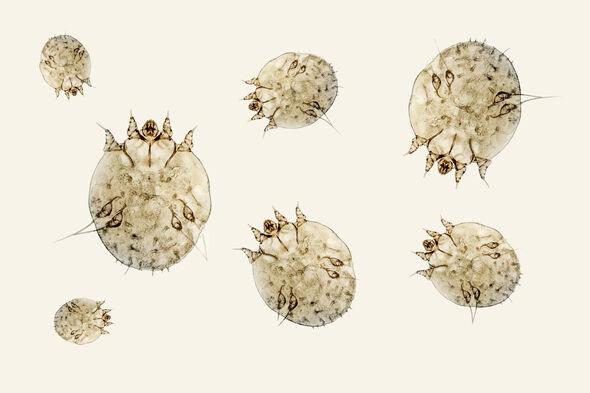
What it is like to have scabies
“The worst thing is not the itching but the fact that you have to worry about it 24/7”
Students increasingly fall prey to scabies, a contagious skin disease caused by the scabies mite. In Eindhoven, too, the number of infections has been rising for years, says infectious diseases doctor Ronald ter Schegget of Municipal Health Service (GGD) Brabant Zuidoost, although, according to him, it is not like the GGD gets calls from students with scabies symptoms every week. However, TU/e student Marit knows from experience that it is extremely unpleasant if the tiny bugs manage to find their way to your skin: “The worst thing is not the itching but the fact that you have to worry about it 24/7.”
It is not something you expect when you start your studies: that you’ll suffer from persistent scabies (also known as mange) for months on end. “It sounded more like something medieval”, says student Marit, who had never heard of the skin condition before when she was infected. “I’d slept with a guy. A week later, he called me to tell me that he had scabies. I wasn’t sure what it was and immediately started researching it.”
The student then decided to apply ointment preventively, but she still got itchy. Only after another three failed ointment treatments and a drug treatment did she finally get rid of the scabies months later… only to get re-infected two more times. The first time by sleeping in the bed of someone who turned out to have scabies. “He had actually gone to sleep in another bed as a precaution, because we didn’t know if I was still contagious.” The second time because a friend who had slept in her bed turned out to have scabies.
Incubation period
“The problem is that the incubation period is six weeks. So that friend didn’t even know she had scabies. But if you’ve had scabies before, as in my case, you’ll get the symptoms much faster. So two days later I was already itching again. I then texted her that I didn’t want to scare her or accuse her, but that I thought I’d contracted scabies through her. That turned out to be true.”
It took her as many as eight treatments and seven months to get rid of the scabies. Normally it does not take that long. As to why it was so difficult in her case particularly, she does not know. “Maybe it had to do with the fact that the boy I got it from had a pretty extreme form; it even caused open wounds. I read an article once about “super scabies”; I don’t know if that really exists, but if it does, it’s probably what we had.”
24/7 mindset
For the past six months, the student has been completely scabies-free. And although the memories of the symptoms have already faded into the background, Marit still has not forgotten the “24/7 mindset”, as she calls it. You see, when you have scabies, it is a constant concern, day and night, says the student. “I felt so self-conscious; of where I went, where I sat, the clothes I put on, where I hung up my coat, who I touched, where I touched them. It’s all these separate things that you have to be aware of all the time: when you hug someone too long, when you accidentally sit on someone’s bed or when someone accidentally sits on yours. You constantly have to tell people: ‘you can’t do this’, ‘you can’t touch me for too long’ and ‘is there somewhere else I can put my coat, because I can’t put it on the coat rack’. It’s very exhausting to worry about all those things at every waking moment.”
On top of that, she felt dirty: “Because there was literally a bug inside me”. She was afraid that other people would also find it gross, or that there would be gossip about her having scabies. So the first time, she kept her infection under the radar. “Later, I did publicly discuss the situation. By then I was well-informed and I could explain what was possible and what wasn’t. For example, I told people they could shake my hand, but it was best not to get in bed with me.” The people around her were very understanding and mainly felt sorry for her.
How to identify scabies
Marit has suffered from scabies for so long that it is easy for her to identify the symptoms now. “It usually starts with itching and a small red bump, which then spreads. And from there, spots and little burrows appear, mostly on your hands and between your fingers.” She says there are also particular areas that get extra itchy, such as your sides, along the waistband of your pants and around your ankles and wrists. “Women also experience itching around their nipples, which is very inconvenient when you’re at uni because you can’t just start scratching there. Men, on the other hand, I believe develop itching around their balls.” Also, the itching builds throughout the day, with its peak in the evening, right when you go to bed, Marit says. “I had to lie on top of my hands, so I couldn’t scratch myself. After a while, I’d manage to fall asleep.”
The fact that Marit was re-infected by friends twice shows that the skin condition was very much prevalent among her circle at the time. “A few years ago, it was circulating even more widely. “I’m part of an association, and at one point, the board even talked about having all of us apply ointment together one evening. But if only one person doesn’t do it, there’s already no point.”
Point of contact
By now, Marit has become something of a point of contact among her friends. Sometimes she receives pictures of bumps, with the question whether it could be scabies. “I don’t mind that, I’ve become so educated on the subject that I know what to look for and have answers to most questions.” Moreover, she thinks it is important to discuss scabies more openly and especially not to make it a taboo subject, in order to eliminate prejudices and misconceptions. “For example, some people compare it to an STD. It’s true that you can contract it by sleeping with someone, but you can also get it without having sex. And you can protect yourself against an STD through safe sex, but there’s nothing you can do against scabies. So it’s unfair to compare the two.” Besides, scabies may sound dirty, and it does feel that way when you have it, says Marit. “But the issue really isn't related to whether you shower enough, which is often assumed. That’s something people should keep in mind.”
Increasing infections
It is true, the number of infections is increasing, confirms Ronald Ter Schegget, infectious diseases doctor at GGD Brabant Zuidoost, but the portrayal of the situation by national media a few weeks ago is a bit more nuanced in reality, he says. “In response to the media coverage, we took another look at our numbers and it’s definitely not the case that the situation is getting out of hand. We’ve had eighty reports this year per 750,000 residents. However, I should add that scabies is not a notifiable infectious disease, so we only know about a small proportion of all cases.”
People who have scabies can consult their general practitioner, but the doctor does not have to report the infection either. Students can call the GGD if they have questions, but will usually only get registered as having scabies by the GGD if the disease keeps coming back, as is sometimes the case in student houses. “We then help them think about what to do to maximize the chances of getting rid of it in one go. However, we can’t guarantee that either.”
Ping-pong effect
The fact that it is particularly difficult for student houses to get rid of the bugs quickly is due to several factors. “First, you have to identify all the students who might have scabies, which is usually a fairly straightforward process thanks to WhatsApp groups. Then, everyone has to start applying ointment or taking pills at the same time. Bed linens have to be washed during the treatment and the day after. Items you can’t wash must be kept in a plastic bag for three days. There’s a risk that students think: the pills help so that’s enough, but if you don’t follow the other measures, someone else in the house might just start scratching a few weeks later. And the result is a sort of ping-pong effect.”
It's not possible to prevent infections, he stresses. “You don't get scabies because your house is dirty or because you’re supposedly not hygienic; that’s nonsense.” Infection requires prolonged skin contact because the scabies mite needs time to transfer from one body to another, the doctor explains. “If you’ve only had tea together, the risk won’t be very high.”
However, the bugs can survive outside the human body for about three days. “That means that if you have scabies and sit on a couch with bare legs, the person who sits on the couch afterwards can become infected.” So no direct skin contact is involved in such a case.
Increase
But what is the reason that the number of infections has been increasing for years? “We have no explanation for that”, says Ter Schegget. “The trend existed even before Covid. We, as GGD, also thought it rather unusual. After all, during the pandemic we saw almost all infectious diseases decline dramatically, but scabies persisted. We did speculate as to why. One possible explanation is that because movie theaters and cafés were closed, students began to host more get-together at home. But the fact that the overall numbers have been increasing for years is something we can’t explain.”
The treating physician for scabies is the general practitioner, but if students have questions, they can contact the infectious diseases team at the GGD. They can be called at 088 0031333.



Discussion